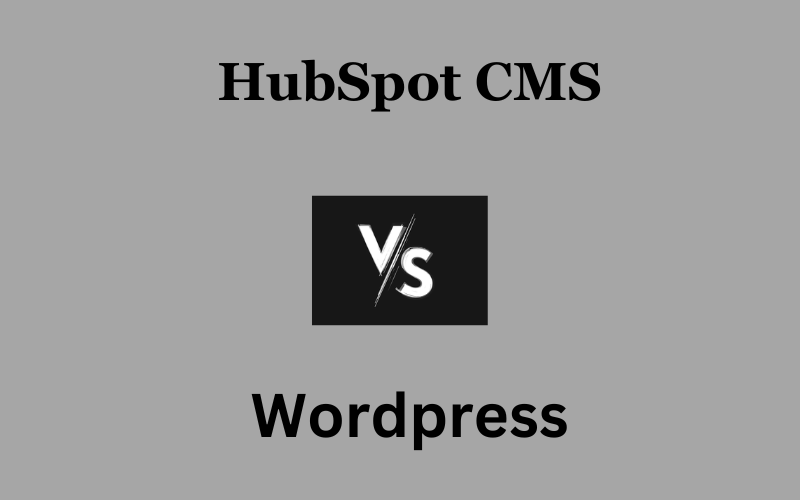Introduction
HubSpot CMS vs WordPress: A Comprehensive Comparison

When it comes to choosing a content management system (CMS) for your website, HubSpot CMS and WordPress are two popular options. Both platforms offer a range of features and capabilities, but they differ in several key areas. In this article, we’ll compare HubSpot CMS and WordPress in terms of ease of use, customization, SEO capabilities, security, integration with other tools, cost, performance, and support and community. Understanding the differences between these two platforms can help you make an informed decision about which one is right for your website needs.

Ease of Use of HubSpot CMS vs WordPress

HubSpot CMS and WordPress are two popular platforms for building websites, but they differ in terms of ease of use. WordPress, being an open-source platform, offers a user-friendly interface that allows users to quickly create and publish content. Its dashboard is intuitive, making it easy for beginners to navigate and manage their websites.

On the other hand, HubSpot CMS is known for its user-friendly content editor, which allows users to easily create and edit content without the need for technical knowledge. It offers a drag-and-drop interface, making it easy to customize the layout of web pages.
Overall, both platforms are relatively easy to use, but WordPress may have a slight edge in terms of user-friendliness due to its widespread adoption and extensive documentation.
Customization in HubSpot CMS vs WordPress
When it comes to customization, both HubSpot CMS and WordPress offer robust options, but with different approaches. WordPress, being open-source, provides a vast library of themes and plugins that allow users to customize their websites extensively. Users can also modify the code directly for more advanced customization.
HubSpot CMS, on the other hand, offers a more structured approach to customization. It provides a range of templates and modules that users can customize to fit their needs. While this approach may be limiting for advanced users, it can be beneficial for those looking for a more guided customization experience.
In summary, WordPress offers more flexibility in customization due to its open nature, while HubSpot CMS provides a more structured approach suitable for users who prefer simplicity and guidance in customization.
SEO Capabilities of HubSpot CMS vs WordPress
Both HubSpot CMS and WordPress offer strong SEO capabilities, but they differ in their approaches. WordPress, with its wide range of SEO plugins like Yoast SEO and All in One SEO Pack, provides users with powerful tools to optimize their websites for search engines. These plugins help users optimize meta tags, sitemaps, and other SEO elements easily.
HubSpot CMS, on the other hand, integrates SEO features directly into its platform. It offers built-in tools for optimizing meta tags, creating XML sitemaps, and analyzing content for SEO best practices. HubSpot’s SEO tools are part of its all-in-one marketing platform, which can be beneficial for users looking for a comprehensive SEO solution.
Overall, both platforms offer strong SEO capabilities, but WordPress may require more manual configuration with plugins, while HubSpot CMS provides a more integrated SEO experience.
Security in HubSpot CMS vs WordPress

Security is a crucial factor to consider when choosing a CMS, and both HubSpot CMS and WordPress take it seriously. WordPress, being open-source, can be vulnerable to security threats if not properly maintained. However, WordPress has a large community of developers who regularly update the core software and plugins to address security issues.

HubSpot CMS, on the other hand, is known for its robust security features. It provides SSL encryption, regular security updates, and monitoring to protect websites from potential threats. HubSpot also offers a secure hosting environment, which adds an extra layer of security for users.
In summary, both platforms prioritize security, but HubSpot CMS may have an edge due to its integrated security features and hosting environment.
Integration with Other Tools in HubSpot CMS vs WordPress

When it comes to integrating with other tools, both HubSpot CMS and WordPress offer a range of options, but with different approaches. WordPress, being open-source, has a vast library of plugins that allow users to integrate with various third-party tools and services. These plugins can help with email marketing, CRM integration, analytics, and more.

HubSpot CMS, on the other hand, is part of the broader HubSpot ecosystem, which includes CRM, marketing automation, and sales tools. This integration offers a seamless experience for users, allowing them to manage all aspects of their business from one platform. HubSpot also provides a marketplace for integrations, making it easy for users to find and install the tools they need.
In summary, both platforms offer strong integration capabilities, but WordPress may require more reliance on plugins, while HubSpot CMS provides a more integrated experience within the HubSpot ecosystem.
Cost of HubSpot CMS vs WordPress

Cost is an important consideration when choosing a CMS, and HubSpot CMS and WordPress offer different pricing models. WordPress is free to use, as it is open-source software. However, users may incur costs for hosting, themes, plugins, and security measures.
HubSpot CMS, on the other hand, is a paid platform that offers various pricing tiers based on the features and services included. The pricing for HubSpot CMS can vary depending on the size of the business and its specific needs. Additionally, HubSpot offers a range of marketing and sales tools that can be bundled with the CMS, adding to the overall cost.
In summary, while WordPress is generally more cost-effective due to its free core software, users may incur additional costs for hosting and plugins. HubSpot CMS, while a paid platform, offers a comprehensive suite of tools and services that may justify the cost for some businesses.
Performance of HubSpot CMS vs WordPress
Performance is key for a website’s user experience and SEO ranking. WordPress, being open-source, can be optimized for performance with the right hosting and caching plugins. However, poorly coded plugins or themes can affect performance.
HubSpot CMS, on the other hand, is known for its performance optimization out of the box. It uses a content delivery network (CDN) and offers caching and image optimization features to ensure fast loading times. Additionally, HubSpot’s hosting infrastructure is designed for performance and scalability.
In summary, both platforms can achieve good performance, but HubSpot CMS may have an edge with its built-in optimization features and hosting infrastructure.
Support and Community for HubSpot CMS vs WordPress
WordPress has a large and active community of developers and users who contribute to forums, blogs, and online tutorials. This community provides extensive support and resources for WordPress users, making it easy to find answers to questions and solutions to problems.
HubSpot CMS also has a strong support system, with dedicated customer support, knowledge base articles, and training resources. Additionally, HubSpot provides a community forum where users can connect with other HubSpot users and experts for advice and assistance.
In summary, both HubSpot CMS and WordPress offer strong support and community resources. WordPress may have a larger community due to its open-source nature, while HubSpot CMS provides more direct support options for its users.





Pingback: Boost Your Workflow with the Best Aircall HubSpot Integration (2024) - RPMSNKHU Reviews
Pingback: How to Create a Portfolio Website: Best Guide for Creatives(2024) - RPMSNKHU Reviews